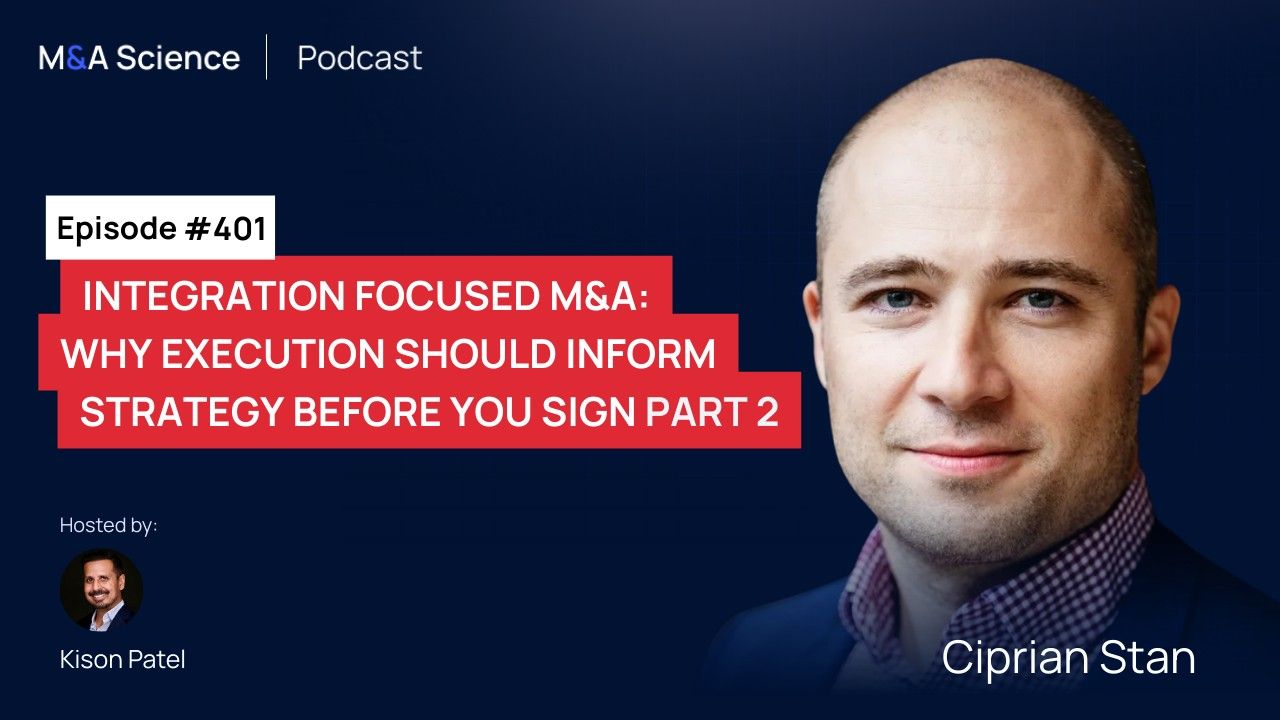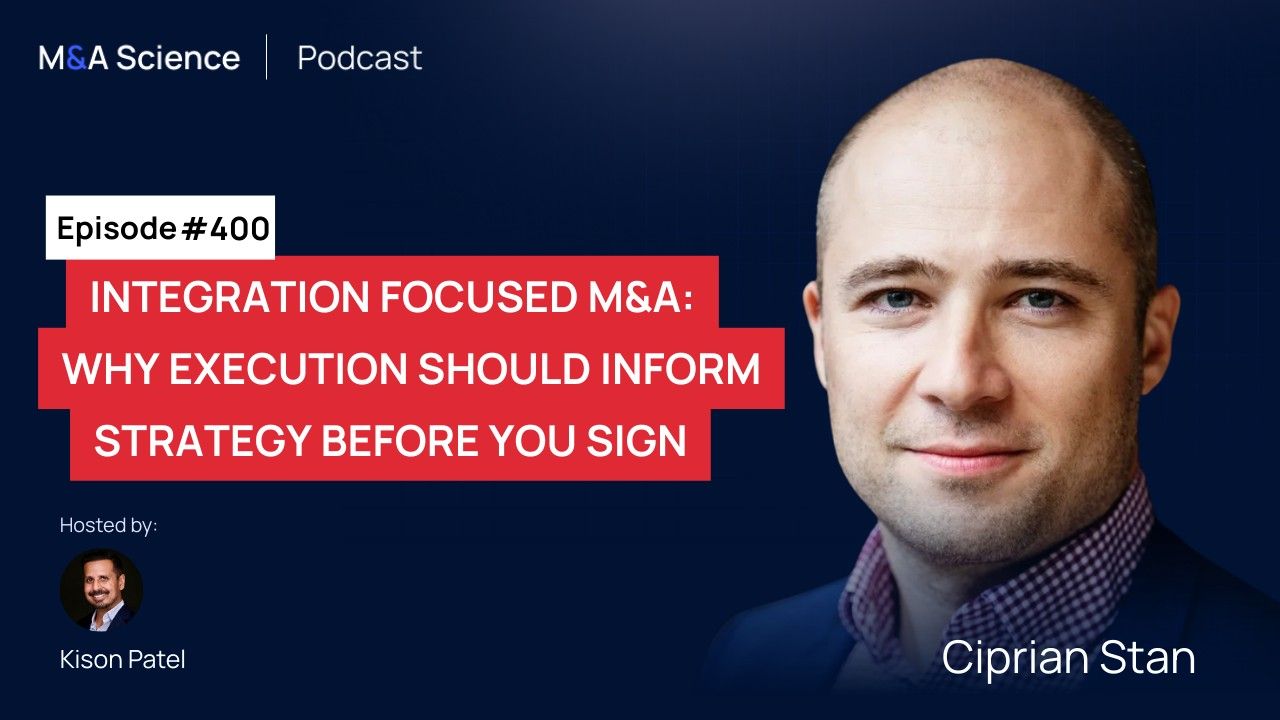_Easy-Resize.com.webp)
Frederic Lebourg
Episode Transcript
The Decision to Sell
During my experience, it was never my decision to sell. It was the decision of the ownership of the company. They need money, and they saw some successful things and tourism was not an essential part of our business. They were mostly European. The American division was just a small asset.
In another company I worked for, my turnaround job was preparing the company for sale. From a money-losing business, I transformed it into something attractive and that could be scaled up because, at the end of the day, an investor or buyer wants to buy something that can be scaled up.
Most large companies and investor doesn't want to buy something for what it is today. They want to buy it for what it can be tomorrow. And my job was basically to make it more palatable to an outside company and its team.
I've also started a company from scratch and eventually sold it. Selling a company can be a strategic driver, but most of the time, it's driven by circumstances. The business's ownership will have a specific need, and at that time they will say it's a good time to sell.
It could also be because the company decided that the specific company they want to sell no longer fits in their portfolio and serves as a distraction.
Dealing with offers
If you received an offer you can't refuse, then you can't refuse. When you are a software company or pharmaceutical company, you discover something that is a game changer. Surely, you will have bigger companies who want to buy you.
But how often do you see a product that changes the landscape if you are in the food industry? Something that will completely change the way people consume food. Most of the time, you are just finding a slightly better product.
And you have to sell the opportunity for a larger person to multiply the product in more places or in a different segment that they haven't been able to enter.
For example, if you are a food service person who hasn't been able to penetrate the supermarket industry, you tell yourself that the product would work in the supermarket too. But it takes millions to launch a new product in a supermarket or in the supermarket trade.
The larger company already has the network, the contact, the brokers, the sales force, and everything. So that's going to be a great fit, and if you are in that situation, what are you really selling?
You are selling an indication to a larger company or an investor that you can generate rapid growth. That is the most important point of your offer - your ability to grow and how they will multiply that and make it even grow faster.
So if you are approaching a group of investors or a larger company and your valuation will be based on EBITDA or multiples of EBITDA, you are not in a great place.
Going To Market
Do not entrust your transaction to investment bankers until you reach a certain size. Their fees are generated mostly on percentage, and if you are a $10 million company and they have a 50 or $75 million company, it will be the same amount of work for them, but the fee is not. So they will prioritize the larger deal because they will earn more.
So it's hard to gain the interest of VCs and Investment bankers until you reach a critical size, and profitability is not enough to attract outside investors. You have to identify your potential buyers yourself.
However, it is best if you're not talking to them because it's always better to be quoted than to be the person trying to get a quote. You want to have the power in the negotiations and it is better if they initiate the transaction first.
Also, if you're trying to sell, don't talk to only one company or one person. You have no leverage if you're pursuing only one deal at a time. You are not ready to go up off your chair and leave the room, which you have to be willing and able to do.
So at the minimum, pursue it with two potential acquirers. If you don't have that, it's going to be off. It's going to be very rough.
Let me give you an example. When I started trying to sell the bagel company called Woody's, I first went the route of business brokers. One of those guys hooked me up with Sara Lee. At the time, Sara Lee was really big in baking.
And so I approached them, and they approached me. They asked me to come to their headquarters in Chicago. They sent me a beautiful car to pick me up at the airport. I had a beautiful room, very impressive and everything.
Then I met many people who basically started telling me, your company is not really profitable. So the maximum offer would be 2 to 3 times EBITDA, which was absolutely not what we were looking for.
So I realized it would not work, so I tried another approach and leveraged the power of professional price. I contacted a couple of professional magazines and told them we are a wonderful story. We started from very little, and now we are big.
Magazines are always looking for these stories, and I was also lucky. After the article about how fast we are growing, I started getting calls. I wasn't the one calling anymore. We had four companies interested in buying us, including Sara Lee.
Now, Sara Lee's offer jumped from less than 10 million to 45 million in two months. And when I got a bigger offer from another company, Sara Lee told me they'd match it and add 5 million more.
Eventually, I went with Spilsbury because I was just not going to walk away because I was getting offered more money.
You just need to spread out the word about your company. I'm not a big fan of knocking on doors because if you send the message that you are in need and trying to sell, it's not the best position to be in. So just be patient and wait.
Just indicate that you are unsure what to do with the company and need help. It all depends on who you are talking to; your message can take different forms. Sometimes selling a dream is easier than selling an achievement.
Steps to Prepare for an Acquisition
First of all, you have to realize that you still have a business to lead, customers to visit, food shows to attend, and problems to deal with. The normal life of your company will not stop because you've decided to sell.
That means if you have already started the selling process and you haven't built up everything that will be asked of you in the due diligence process, you are setting yourself up for a very hard situation.
You're going to be torn between the daily need of the business and selling the company. It's going to be even more pressure because if you have an accident or the loss of a major customer, it will freak out and spook the potential buyers.
You must prepare because everything will be asked of you during due diligence, and due diligence isn't fair. They are exhausting and very detailed. Every little bit of agreement, paper, lease buying agreement, selling agreement, whatever you have will be examined.
You have to start building folders on your computer and making a due diligence folder. And at the end of the process, that thing will be 15 folders alone and probably tens of thousands of pages, and that's a reality.
Your whole company's life since inception will have to be in that folder. Nothing is worse than being asked for documentation you don't have. You will look unprofessional and unprepared.
They will think you don't have clean records and that your books are not in order. You are opening a whole bunch of questions that are going to affect your credibility and attractiveness. So most definitely, you want to have your due diligence ready.
The second thing, if you want to sell, have multiple new product development ready to launch in your program available. Because, again, people will pay more for something that could happen than something that has happened.
If you have five more products about to launch in the next six months, the buyer will suddenly think they can do it better than you. Because of course, the acquiring side is always working from the idea that they know more or they will do better than you. Otherwise, they wouldn't buy you.
Then have your team ready. Not necessarily an investment banker, but if you're going to sell a company, you need to have an excellent tax attorney available. Taxes are complicated matters.
The buyer, most of the time is a lot more knowledgeable and a lot more astute than you are on taxes, and they will want the deal to work to their advantage on the most basic level. If you let the buyer guide you, you are always going to be in a defensive position where you have to push back and push back.
So have a clear idea of what type of deal structure you want from a tax standpoint and a future standpoint.
Also, decide where you want to be.
- Do you want to be part of the future company?
- Do you want to have a transition hold?
- Do you want to take the money, run, and start something else?
You have to decide that from the get-go before you talk to people.
Internally, your people. What is your situation? Are you in a situation where your people have a strong vested interest in you selling the company, or are you the sole benefactor of the sale?
That's a very different situation because in one situation, everyone will be pushing for the deal, and in the other case, you will have a choice between fighting everyone or taking care of them. Because if they leave, the buyer might be turned off.
Also, contemplate if you will have outside actors having leverage on the deal.
For example, if you are leasing a property, if you're leasing your plant, or your building, there is a very high probability your lease won't be transferable.
I have been in a situation where the landlord won't accept the assignment of the lease until I accept a 30% rent increase good for three to seven years. The guy is literally holding me hostage.
So ask yourself if any outside actors can hold the deal hostage.
- Do you have any dirty laundry?
- Do you have any lawsuits pending?
Because they will come out during due diligence, or if you are good enough to hide them, they will come back to haunt you. Because in some form, you will have a representation and warranty part of the deal. And if you misrepresented, you're going to end up in court and giving back a lot of what you make.
And this is where an outside council can be most helpful because that guy is not going to have the same vision of the business as you do. And he's going to look at the hard fact. And so, work with an experienced acquisition attorney. You are going to spend multiple six figures or possibly more, but this is money that is very well spent.
And if you know you can't afford that money, then you probably shouldn't sell in the first place because it means you're weak.
Acquisitions can go quickly, and they can also take forever. So always look the best, but be prepared for the worst.
Internal Alignment
Suppose you had a management style where all the key employees have a vested interest in the sale and most of the people won't lose their job, all of a sudden. In that case, they see something bright on shiny ahead that will make them a participant instead of enemies of the deal.
You have to communicate it and be transparent about it. It's hard to do it in a concealed manner. And if your people feel that you are misleading them, this is when you start demoralizing people. This is when people are leaving you.
And that's of course, very detrimental to the deal and the future of the business. Because if you've been successful, it's not because of you, it's because of the people around you.
I'm a big fan of ensuring that all the key people are incentivized somehow. Most people will be grateful and happy with that. And all of a sudden, they will help you make that sale happen.
If people figure that you are lying to them, you are losing loyalty, you're losing enthusiasm, you are losing a lot of things. And let's keep in mind that the sale will not often go through. There is a lot more unsuccessful sale, and they are successful ones. So if you destroy your team in the process, you're not in a good place.
M&A Software for optimizing the M&A lifecycle- pipeline to diligence to integration
Explore dealroom

Want to wear your M&A expertise?
Check out the M&A Science store.




.jpeg)
